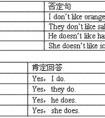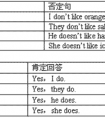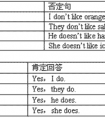小题1:Few students ______( ask ) to work hard at their lessons here, are they?小题2:The police promised that they ______(solve) the case as soon as possible.小-九年级英语
用于come,go,leave,start,arrive等表示位置转移的动词时,也可以用过去进行时表示过去将要发生的动作。
如:He told me that he was going soon. 他告诉我他很快就要走了。
3、表示故事发生的背景。
It was snowing as the medical team made its way to the front.
那支医疗小组往前线行进时,天正下着雪。
4、表示一个新的动作刚刚开始。
过去进行时可用来引出一个新的动作,这种用法颇有点儿像镜头转换。
Five minutes later,he stood in the doorway smoking a cigarette.
5分钟后,他已站在门口抽着烟。
5、过去进行时还可和when结构遥相呼应,含有意外之意。
I was walking in the street when someone called me.
我正在街上走时突然有人喊我。
6、用来陈述原因或用作借口。
She went to the doctor yesterday. She was having a lot of trouble with her heart.
她昨天去看病了。她患了很严重的心脏病。
7、与always,constantly等词连用,表示感情色彩。
The girl was always changing her mind.
这女孩老是改变主意。
考点名称:一般现在时
- 一般现在时:
:表示通常性、规律性、习惯性的状态或者动作(有时间规律发生的事件)的一种时间状态。 - 一般现在时的具体用法:
1. 表示经常的或习惯性的动作,常与表示频率的时间状语连用。
e.g. I leave home for school at 7:00 every morning.
2. 表示客观事实和普遍真理。
e.g. The earth moves around the sun.
3. 表示现在发生的具体动作或存在的状态
e.g. He lives in Beijing now.
4. 习惯性的爱好或行为
e.g. I like dancing while she likes singing.
5. 表示预先计划或安排好的行为。
e.g. Our class begins at 7:45.
6. 在时间状语从句和条件状语从句中,常用一般现在时代替将来时。
e.g. If you come, we will wait for you.
7. 表示格言或警句中。
e.g. Pride goes before a fall. 骄者必败。
8.表示主语具备的性格、能力、特征和状态。
e.g. I don't want so much.
Ann Wang writes good English but does not speak well.
比较:Now I put the sugar in the cup.
I am doing my homework now.
9.在时间状语从句和条件状语从句中,常用一般现在时代替将来时。
10.小说故事用一般现在时代替一般过去时。新闻报道类的内容,为了体现其“新鲜”性,也用一般现在时来表示过去发生的事情。
11.有些表示状态和感觉的动词表示现在发生的具体行为时,只用一般现在时,而不用进行时态。
注意★:此用法如果出现在宾语从句中,即使主句是过去时,从句谓语也要用一般现在时。
例:Columbus proved that the earth is round.. 第一句用一般现在时,用于操作演示或指导说明的示范性动作,表示言行的瞬间动作。再如:Now watch me,I switch on the current and stand back. 第二句中的now是进行时的标志,表示正在进行的动作的客观状况,所以后句用一般现在时。 - 一般现在时与现在进行时的区别:
一、两种时态的主要含义:
一般现在时
1.表示事物的本质特性或客观存在,没有时限性。
The table ____ soft。(feels) 表特性特征。
Japan ___ in the east of China。 (lives) 表客观事实
2.现阶段经常性、习惯性的行为,可带频率时间。
The shop closes at 7:30 p.m.
Father doesn’t smoke. (习惯)
3.表说话时的状态,感觉或结果,一般用状态动词,如:
It doesn’t matter. Does it hurt? (感觉结果)
4.特殊用法:
-在条件、时间、让步从句中用现在时代替将来。
-If you go there,I’ll help you.
—用在begin,come,go,leave,return,open,close 等短暂谓语动词表规定计划。
The plane takes off at 11:30. (不受主观支配的计划)
-在剧本、解说、标题或there(here)开头的句中表进行
There goes the bell/Here comes Mr.Wang.
I declare the meeting opens.(正在宣布)
He meets the ball and hits back to No.2 (正在发生)
现在进行时
1.说话时正在发生,进行的动作
Look! Dark clouds are gathering . (正在发生)
2.表现阶段正在进行,但此刻不一定正在进行的事。
He usually gets up at 6:00,but this week he is getting up at 7:00.
(现阶段正在进行,但说话时不一定在起床)
3.现在进行时的特殊意义
-表示主观打算常用于 go,come,leave,start,begin 等,位移、趋向动词。
How long are you staying here (准备停留)
-表示眼前刚过去的语意即“话音刚落”,适用于tell,say,talk,discuss
You don’t believe it You know I’m telling the truth.
-表示安慰、关心、喜欢、讨厌等感情色彩。
He is always making noises in class. (讨厌)
-在条件、时间、让步状语从句中表示将来正在进行。
Don’t bother him if he is reading this time tomorrow.
二、严格区分进行时与一般时的语义
1. 持续动词的一般时表持续情况,经常性,习惯性行为或客观存在的事实,进行时表暂时性或有限时刻的持续。
2.短暂动词的一般时叙述事实,特征,能力而短暂动作进行时描述反复发生,即将发生或刚开始行为。
3.短暂动词和静态动词一般时表示实际情况客观状态、结果、特征、特性,进行时表未完成含开始或渐进之意。
The bus stops. (车停了-事实)
The bus is stopping. (渐渐停下来)
I love the job. (静态事实)
I am loving the job. ( 渐渐爱上了)
4.come,go,leave,start,return,move,reach,sail,fall 等一般时态表客观规定计划,进行时表主观打算推测。
Flight 254 leaves at 5:30. (表主观打算)
The plane is taking off an hour later.(主观判断)
5.现在进行时带always,often,usually,sometimes,等频率副词表感情色彩,一般现在时则没有此用法。 一般现在时的句子转换:
(1)当句子中有be动词或情态动词时,则把be动词或情态动词(can,could等等)提到主语的前面变成疑问句;在be动词或情态动词后面加not变成否定句.
例:
①陈述句:She is a student.
疑问句→ Is she a student?
否定句→ She is not a student.
②陈述句:I can swim.
疑问句→ Can you swim
否定句→ I can not swim.
(2)当句子中即没有be动词,也没有情态动词时,则在主语前加助动词do (you,以及复数),does(单数she,he,it)变成问句;
在主语后谓语动词前加助动词don’t(I,you,以及复数), doesn’t(单数she,he,it)变成否定句,助动词后的动词要变成动词原形。
例:
①陈述句:We get up at 7:00 every morning.
疑问句→Do you get up at 7:00 every morning?
否定句→We don’t get up at 7:00 every morning.
②陈述句:She has a little brother.
疑问句→ Does she have a little brother?
否定句→ She doesn’t have a little brother.一般现在时的表达方法:
主要通过谓语动词的变化和用时间词语来表示,其中最主要的是谓语动词的变化。现在一般时动词变化的规则是:
1.如果主语是名词复数和第一人称I、 we ,谓语动词不用做任何变化,即仍然用动词原形表示:
We usually go to school at 7:30. 我们通常7:30上学去。[go]
My parents give ten yuan to my sister every week.我父母每星期给我妹妹十元钱。[give]2.主语是任何一个单数名词或者是第三人称单数,谓语动词要进行必要的变化。特别提一点:不可数名词也算作单数处理。
3.谓语动词的变化规律是:
第三人称单数的构成见下表:






